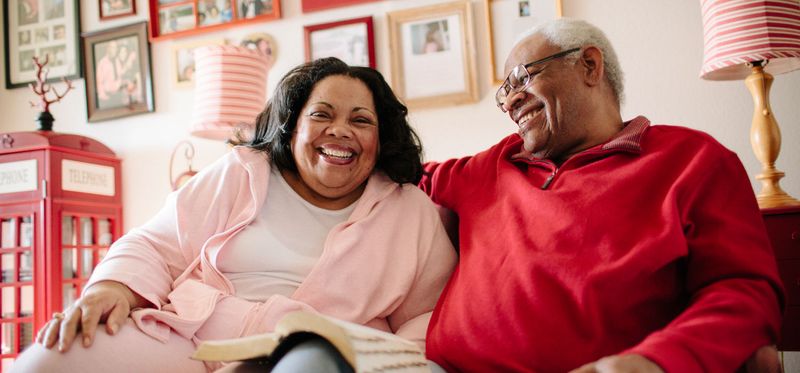People Who Stay In Loveless Marriages As They Age Usually Have These 17 Reasons
Exploring the reasons why some individuals choose to remain in loveless marriages as they age, this article delves into the complex emotions and societal pressures that influence such decisions.
Whether it’s financial security, fear of loneliness, or social expectations, the motivations are deeply personal and often intertwined with one’s life experiences and beliefs.
1. Financial security outweighs emotional fulfillment

For many, financial stability remains a cornerstone of their relationship. As retirement looms, the fear of fiscal insecurity can overshadow emotional needs. Finances often dictate lifestyle choices, and the comfort of a shared economic foundation can outweigh personal happiness.
This pragmatic approach might seem cold, but it ensures a secure future. The emotional void is accepted as a trade-off for financial peace.
It’s not merely about wealth; it’s about maintaining a familiar standard of living and avoiding potential financial despair, which can be daunting in later years.
2. Fear of being alone later in life

The thought of facing old age alone is a powerful deterrent against leaving a loveless marriage. Loneliness can be more frightening than a lack of romantic connection.
For some, companionship, even without love, offers comfort in the face of inevitable aging. The idea of coming home to an empty house can be unbearably lonely, making the known presence of a partner preferable.
While love may have faded, the companionship provides a semblance of support and reassurance against the fear of isolation.
3. Concern about what the children will think—even as adults

Children’s perceptions weigh heavily on the decision to stay in a marriage. Even adult children can heavily influence parents’ choices.
Parents often fear disappointing their children or disrupting familial harmony. The prospect of explaining a separation to grown children, who have their own families, can be daunting.
The desire to maintain a united family front, even at the cost of personal happiness, remains a compelling reason to stay together.
4. Social or religious pressure

Many individuals adhere to societal or religious norms that frown upon divorce. The pressure to conform to community standards can be immense.
Continuing a marriage, despite the absence of love, often stems from a deep-seated need to fit in with societal expectations. For those devout in their faith, religious doctrine can play a significant role in their choice to remain married.
The fear of being judged or ostracized by the community often outweighs personal desires for emotional fulfillment.
5. Lack of a support system

Without a robust support network, leaving a marriage can seem impossible. Friends and family often provide the emotional scaffolding necessary to take such a daunting step.
Without this support, individuals may feel trapped in their current situation. The absence of close connections can exacerbate feelings of loneliness and vulnerability, reinforcing the decision to stay.
For many, the potential isolation of leaving outweighs the emotional drain of staying in an unloving partnership.
6. Starting over feels too overwhelming

The prospect of starting a new life is overwhelming, especially in later years. The idea of rebuilding from the ground up can be paralyzing.
The known routine, even if emotionally unsatisfying, often feels safer than the uncertainty of change. The emotional and logistical challenges of starting over may feel insurmountable.
For those who have invested decades into their lives, the fear of the unknown can be a powerful force in maintaining the status quo.
7. They’ve accepted emotional distance as the norm

Over time, emotional distance can become a norm, making the absence of love seem ordinary. For some, this detachment is simply a part of life.
When romantic feelings fade, individuals might settle into a comfortable routine, even if it’s devoid of passion. This acceptance of emotional space often becomes a habitual part of their interaction.
Resigned to a lack of intimacy, they continue on, as the alternative seems unnecessarily disruptive.
8. Hope for change still lingers

Hope is a tenacious force. Many hold onto the belief that a loveless marriage can change. They cling to memories of happier times, hoping for a rekindling of those moments.
The potential for transformation, however slim, offers a glimmer of optimism. This hope, often irrational, keeps them anchored in their current situation.
Despite the odds, they prefer the possibility of change over the certainty of separation.
9. They don’t want to be the one who “gave up”

The fear of being labeled as someone who ‘gave up’ is a significant motivator. Pride and the desire to persevere often overshadow emotional dissatisfaction.
The stigma of divorce can feel like a personal failure, pushing individuals to endure unhappy relationships. They equate persistence with success, believing that enduring hardship is a testament to their character.
This sense of duty to uphold the marriage vow, even without love, is a powerful deterrent against leaving.
10. Shame around divorce

Divorce carries a stigma that can invoke feelings of shame. For some, the public acknowledgment of an unsuccessful marriage is deeply humiliating.
The judgment of peers, family, and society can be unbearable, leading to a preference for remaining in an unfulfilling relationship. This fear of disgrace often outweighs the desire for personal happiness.
The pressure to maintain appearances and avoid the label of ‘divorced’ can be overwhelming.
11. They’ve built an entire life together—even without love

A shared history can be a compelling reason to stay. The life built together over decades holds immense sentimental value.
The intertwined lives, with shared memories and experiences, create a bond that, while devoid of love, is hard to sever. The thought of dismantling this shared existence can be more painful than enduring the absence of affection.
This connection, rooted in the past, offers a sense of identity and continuity.
12. It’s easier than facing the unknown

The comfort of familiarity often trumps the fear of the unknown. Even when love is absent, the predictability of daily life can be reassuring.
The security of a known environment, despite its lack of emotional fulfillment, can feel safer than the uncertainty of change. The fear of what lies beyond the familiar can be paralyzing.
For many, the effort to maintain the status quo is less daunting than facing the potential upheaval of leaving.
13. Fear of judgment from friends or community

Judgment from friends and community can be a powerful deterrent against leaving a marriage. The fear of becoming the subject of gossip or negative speculation is real.
In tight-knit communities, personal decisions are often scrutinized. The pressure to maintain appearances and avoid becoming a topic of discussion can outweigh personal happiness.
This external pressure, while intangible, exerts a significant influence on personal choices, often keeping individuals in loveless marriages.
14. They worry about health or caretaking needs

As health issues arise with age, the need for a caretaker becomes pressing. The practical considerations of having someone to rely on in times of illness can overshadow emotional dissatisfaction.
For many, the prospect of facing health challenges alone is daunting. The shared commitment to care for one another in sickness and health often keeps individuals together, even without love.
This mutual dependency offers a sense of security and reassurance in later years.
15. They’ve normalized emotional neglect

In some marriages, emotional neglect becomes normalized over time, making its absence seem ordinary. The lack of emotional fulfillment turns into an accepted way of life.
This resignation to a loveless existence often stems from long-term habituation. The effort to redefine emotional expectations feels unnecessary, as the status quo becomes comfortable.
For some, the absence of emotional connection is simply a part of their marital landscape, not worth the disruption of change.
16. They believe their happiness doesn’t matter anymore

With age, some individuals resign themselves to the belief that personal happiness is no longer a priority. The sacrifices made over years seem to nullify the need for emotional fulfillment.
This selfless attitude, while noble, often leads to enduring unsatisfying relationships. The belief that personal desires are secondary to others’ needs becomes ingrained.
The internalized notion that their happiness is irrelevant keeps them tethered to a loveless marriage.
17. They’ve convinced themselves it’s “too late”

The belief that it’s ‘too late’ to change their situation often keeps individuals in loveless marriages. The passage of time creates a sense of irreversible commitment.
This mindset, compounded by years of routine, fosters a reluctance to pursue personal happiness. The thought of starting anew feels implausible, as time seems to have slipped away.
For many, the perception of time lost outweighs the potential for a new beginning.







